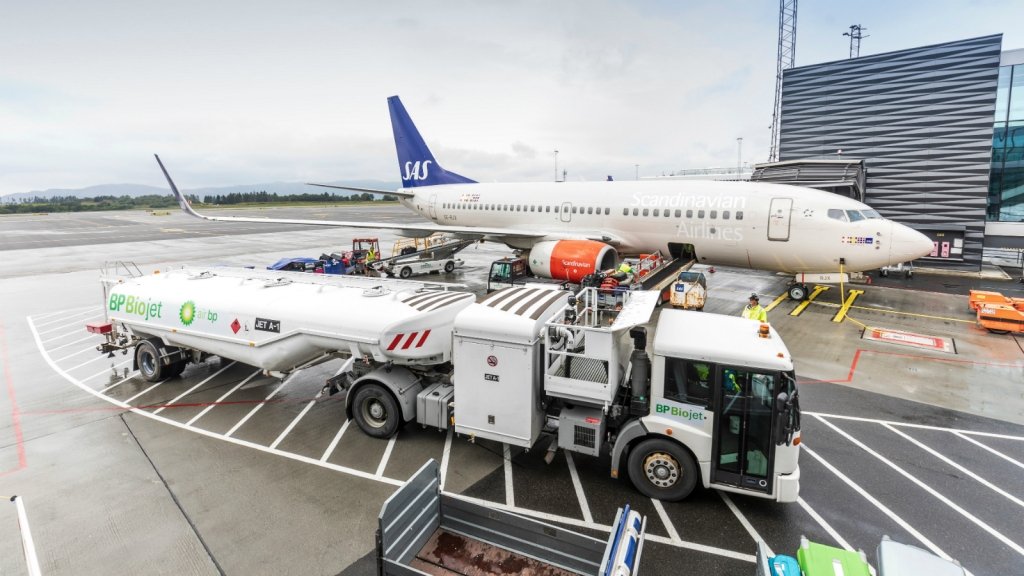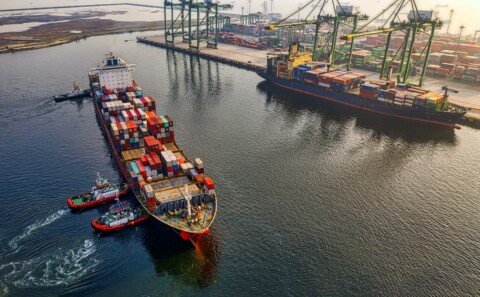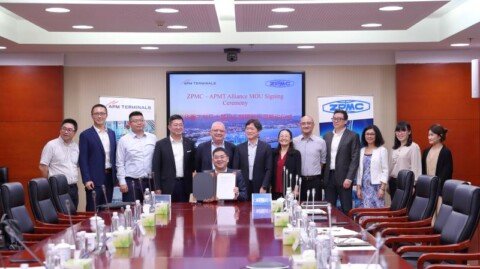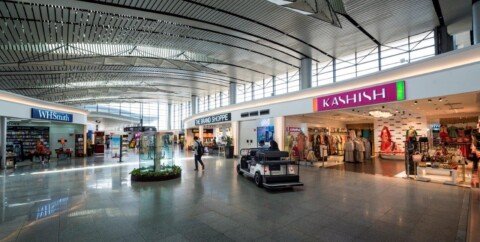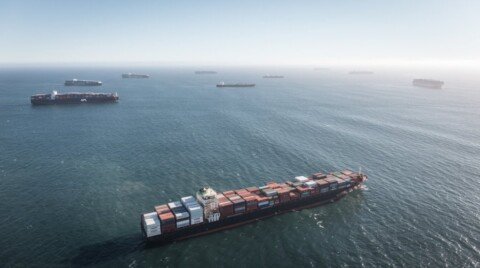With air freight representing 1.9% of all global greenhouse emissions, maritime shipping accounting for about 1.7%, and land transport 11.9%, the logistics industry altogether had understood the need to rise up and be is a crucial facilitator in reducing overall greenhouse gases. As sustainability becomes more and more critical, freight businesses and logistics service providers are looking for ways to grow their economic base, and make a positive social impact with their ecological footprint. Sustainable Aviation Fuels (SAF) has been identified as one of the key elements in helping achieve the change.
In November 2020, DB Schenker partnered with Lufthansa Cargo and flew the world’s first CO2-neutral all-cargo flight from Germany (Frankfurt) to China (Shanghai), and back to home. The Boeing 777F cargo aircraft used SAF on both legs of the flight.
As a real alternative to fossil fuels, SAF is produced from waste materials, such as those derived from used cooking and vegetable oils, landfill, municipal waste, crop waste, and more. More critical, SAF can have up to 80% fewer Greenhouse Gas (GHG) emissions than traditional conventional kerosene fuels resulting in CO2 emission reductions and cleaner air.
With the start of the summer schedule, DB Schenker has been offering clients CO2-neutral airfreight service, in collaboration with Lufthansa Cargo. This covers a weekly flight on the Frankfurt-Shanghai route with one of the airline’s 777-200 freighters.
Significantly, Lufthansa’s ‘Miles & More’ passenger customers now compensate for their CO2 emissions as the Miles & More app has integrated the airline’s ‘Compensaid’ compensation platform which was launched in 2019. Customers can see the CO2 emissions of their flight in the app and offset them directly using their airmiles or with a charge in Euros. Customers can decide whether to offset through the use by the airline of SAF or through certified reforestation projects of the ‘myclimate’ foundation. The enabling application is called ‘mindfulflyer’ and was developed jointly by Miles & More and the Lufthansa Innovation Hub. With the mindfulflyer function, participants are reminded regularly to compensate their flights.
Cargo carrier Atlas Air Worldwide also completed a test flight from Europe to Latin America using SAF sourced from fresh vegetable oil. The flight from Spain’s Zaragoza airport to Mexico City which flew on December 22 day is “believed to be the first transoceanic commercial cargo flight in Spain to include a blend of SAF and Jet A-1 fuel”. Atlas operated a Boeing 747-400F for the mission, with the jumbo using a fuel mixture which included 2.33% SAF.
In December 2020, Air France KLM Martinair Cargo (AFKLMP) also launched a SAF programme allowing shippers and forwarders to select how much of their freight they would like to be flown using SAF. Based on a ‘book and claim’ system, customers determine their own level of engagement with the programme and their entire investment is used for sourcing SAF.
Air France and KLM have been involved in research and development programmes in the field of alternative fuels for many years. Reportedly, the two airlines operated the world’s first commercial flight using SAF in June 2011, with a flight from Amsterdam Airport Schiphol to Paris Charles de Gaulle, demonstrating a possible alternative to fossil fuels.
KLM already operates the Corporate BioFuel Programme that enables businesses with a corporate contract with the airline to offset the CO2 emissions from business passenger travel using SAF. Partners in the programme pay a surcharge that covers the difference in cost between biofuel and traditional fossil-based kerosene.
In January, AFKLMP and Kuehne+Nagel (K+N) teamed up to launch a zero emissions airfreight route—the first route of its kind in the industry. It is said that all of K+N’s cargo on the Los Angeles—Amsterdam route would be covered by SAF.
“This first carbon-neutral lane underlines the strong sustainability programmes of partners, Kuehne+Nagel’s Net Zero Carbon programme and AFKLMP Cargo’s SAF programme which aim to connect people and goods through sustainable logistics,” the companies said.
Soon after that, French service provider Bolloré Logistics joined AFKLMP’s SAF programme. The collaboration began in January on the Paris and New York JFK route. The move is said to cut CO2 emissions of the logistics firm’s shipments in the tradelane by at least 50%. Bolloré has set itself a target to reduce the CO2 emissions linked to its transport services by 30% by 2030.
In April, Dutch biocontrol company Koppert Biological Systems entered into a partnership with AFKLMP, becoming the airline’s first freight shipper to join the SAF programme. Within the framework of the partnership, AFKLMP is using SAF on selected international cargo flights carrying Koppert’s agricultural and horticultural products for biological pest control.
Meanwhile, forwarders continue to sign up for AFKLMP’s SAF programme—with Thailand-based Best Global Logistics (BGL) joining the programme for its 2021 marine logistics shipments as part of its ‘Going Green’ strategy, while Dutch forwarder Fast Forward Freight (FFF) and Spanish forwarder Airpharm Logistics also signed up to the programme to reduce its operational impact on the environment and sets targets for improvement.
Most recently, the Middle East South Asia (MESA) operation of one of the largest global logistics service providers—Hellmann Worldwide has become the first in the region to join the AFKLMP SAF programme.
Chicago-based United Airlines also plans to lead the industry towards a more sustainable future with the launch of the first-of-its-kind ‘Eco-Skies Alliance’ programme. Working with the airline, more than a dozen leading global corporations will collectively contribute towards the purchase of approximately 3.4 million gallons of SAF this year. The airline said it has already partnered with global firms like Autodesk, Boston Consulting Group, CEVA Logistics, Deloitte, DHL Global Forwarding, DSV Panalpina, HP Inc, Nike, Palantir, Siemens, and Takeda Pharmaceuticals to finance low-carbon, SAF derived from trash.
Though tiny compared with the 4.3 billion gallons of jet fuel that United consumed in 2019 prior to the start of the COVID-19 pandemic, the amount triples the roughly 1 million gallons of sustainable fuel it has used each year since 2016.
Similarly, Kuehne+Nagel (K+N) entered into an agreement with American Airlines to deploy 11 milliom litres of SAF. The deal is part of K+N’s ‘Net Zero Carbon’ programme. Through the agreement, American will allocate a portion of the carbon reduction benefit generated through its use of SAF to K+N.
In December 2020, DHL Express also signed a deal with energy firm Shell Aviation to power its flights with SAF from Amsterdam Schiphol Airport. Volume-wise, Shell Aviation is supplying a full year of DHL Express’s fuel requirements from Schiphol, which will thereby help the international express logistics provider to reduce its emissions from the hub.
Earlier in March, Deutsche Post DHL Group (DP DHL) unveiled its new sustainability roadmap, detailing its €7bn investment in green technologies, such as SAF, to help it further reduce its Co2 emissions over the next ten years. The sustainability roadmap which covers the company’s operations until 2030 is in addition to its target of achieving zero emissions by 2050—first announced in 2017.
The company said it is aiming to reduce its CO2 emissions from 33 million tonnes in 2020 to less than 29 million tonnes by 2030. To achieve this, it will gradually operate its vehicles and buildings more sustainably.
K+N and IAG Cargo, the cargo division of International Airlines Group, recently completed a chain of 16 charter flights from Stuttgart to Atlanta fully carbon neutral after securing initial 1.2 million litres of SAF. This collaboration marks the first time ever that such a charter chain is operated with net zero carbon emissions. The entire project utilised aircraft primarily suited for passenger travel, but temporarily operated in support of cargo.
The last of the British Airways B787-900 flights left Stuttgart on June 26 with an average of 45 tonnes of automotive spares and other industrial goods from shippers destined for Atlanta. Since it began its charter service last year, K+N has now completed 328 automotive charters—all carbon neutral either via offsetting or use of alternative fuel.
The SAF was provided by Neste, a leading provider of SAF. Neste MY Sustainable Aviation Fuel is made from sustainably sourced, renewable waste and residue raw materials. The SAF, sourced by IAG, was blended with fossil jet fuel to comply with aviation fuel certification standards, shipped to the UK from Europe and then transported by underground pipelines into Heathrow.
Digital air cargo booking platform CargoAi and service provider Seko Logistics have also launched new initiatives to make their operations more sustainable.
CargoAi has launched new features enabling freight forwarders to assess and reduce their CO2 emissions. CargoAi said it added the features in response to demand, as they are highly sought after by clients at a time when sustainability is playing an increasingly significant role in air cargo. The platform’s ‘Flight Search’ tool allows users to choose routes and airlines based on their carbon impact and calculate the CO2 emitted from each shipment. It also provides monthly CO2 reports, helping users to analyse the impact of their business’s emissions.
Meanwhile, Seko Logistics said it has joined the Sustainable Air Freight Alliance (SAFA)—established by BSR, a team of sustainable business experts that works with a global network of more than 250 member companies. According to Seko, SAFA is a tangible opportunity for them to contribute to the positive decarbonisation work being undertaken by the aviation industry. The alliance is all about ‘buyer-supplier’ collaboration between shippers, freight forwarders and airlines to track and reduce carbon dioxide emissions from airfreight and promote responsible freight transport.
SAFA provides a collaborative platform for sharing and learning sustainability information, best practices, and innovation to help achieve company goals. Airlines report on qualitative data, including carbon efficiency for fleet (average), per trade lane, per flight classification, and per aircraft model. This encapsulates policies and compliance, sustainability governance, GHG footprint disclosure and targets, and alignment with International Civil Aviation Organisation (ICAO) goals for sustainable fuels offsets.
This carrier-specific data enables shippers and forwarders to more accurately measure carbon footprint, set their own GHG reduction targets and track progress against them.
End note
A new report by the International Energy Agency’s (IEA) Bioenergy Task 39 has provided an extensive analysis of the current and potential technologies for production of SAFs.
According to the report, SAFs will have to play a major role if the aviation sector is to significantly reduce its carbon footprint.
However, to date it added, commercialisation has been slow and current policies have proved inadequate to accelerate commercialisation and widespread deployment of the various technologies described in the report.
As described in IEA’s recent publication Net Zero by 2050: A Roadmap for the Global Energy Sector, although synthetic hydrogen-based jet fuels will also play an important role in the future, in the short-to-mid-term biojet fuels will predominate.
Annual volumes of biojet fuel have increased in recent years, from less than 10 million litres in 2018 to likely more than 1 billion litres by 2023 (and potentially 8 billion litres by 2030).



